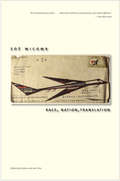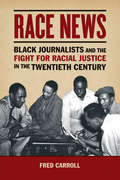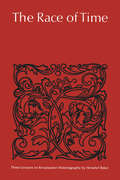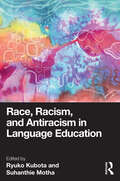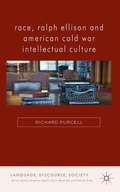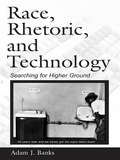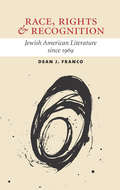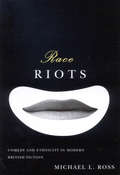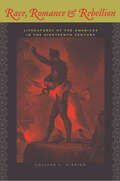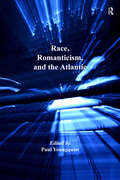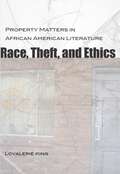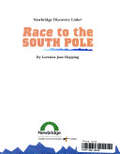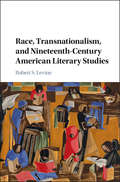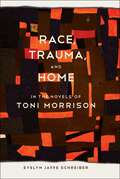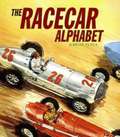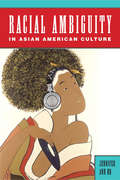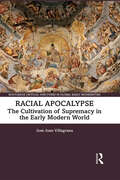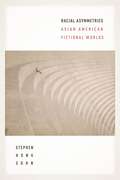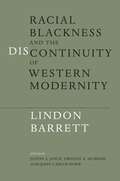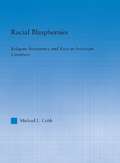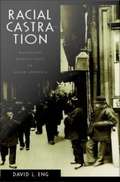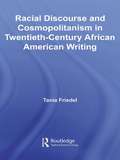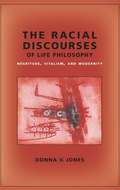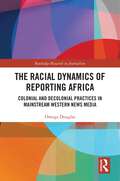- Table View
- List View
Race, Nation, Translation: South African Essays, 1990-2013
by Zoë Wicomb Andrew van der VliesThe first collection of nonfiction critical writings by one of the leading literary figures of post-apartheid South Africa The most significant nonfiction writings of Zoë Wicomb, one of South Africa’s leading authors and intellectuals, are collected here for the first time in a single volume. This compilation features critical essays on the works of such prominent South African writers as Bessie Head, Nadine Gordimer, Njabulo Ndebele, and J. M. Coetzee, as well as writings on gender politics, race, identity, visual art, sexuality, and a wide range of other cultural and political topics. Also included are a reflection on Nelson Mandela and a revealing interview with Wicomb. In these essays, written between 1990 and 2013, Wicomb offers insight on her nation’s history, policies, and people. In a world in which nationalist rhetoric is on the rise and diversity and pluralism are the declared enemies of right-wing populist movements, her essays speak powerfully to a wide range of international issues.
Race News: Black Journalists and the Fight for Racial Justice in the Twentieth Century
by Fred CarrollOnce distinct, the commercial and alternative black press began to crossover with one another in the 1920s. The porous press culture that emerged shifted the political and economic motivations shaping African American journalism. It also sparked disputes over radical politics that altered news coverage of some of the most momentous events in African American history. Starting in the 1920s, Fred Carroll traces how mainstream journalists incorporated coverage of the alternative press's supposedly marginal politics of anti-colonialism, anti-capitalism, and black separatism into their publications. He follows the narrative into the 1950s, when an alternative press re-emerged as commercial publishers curbed progressive journalism in the face of Cold War repression. Yet, as Carroll shows, journalists achieved significant editorial independence, and continued to do so as national newspapers modernized into the 1960s. Alternative writers' politics seeped into commercial papers via journalists who wrote for both presses and through professional friendships that ignored political boundaries. Compelling and incisive, Race News reports the dramatic history of how black press culture evolved in the twentieth century.
The Race of Time: Three Lectures on Renaissance Historiography
by Hershel BakerProfessor Baker recounts and analyses the relations of the English Renaissance historians to other writers of their time and to the historians of later ages. Supported and enlivened with a wealth of quotation from the historians themselves, their critics and their colleagues, The Race of Time illuminates the problems of historiography in an age when academic freedom was always subservient to the national interest, to the sensitivity of rulers, to the prevalence of legends, and to the envy of contemporaries.
Race, Racism, and Antiracism in Language Education
by Ryuko Kubota Suhanthie MothaBuilding on the pioneering 2009 volume, Race, Culture, and Identities in Second Language Education, this book reflects the significant expansion in the research since its publication and offers a wider breadth of perspectives on the complex theoretical terrain of race, racism, and antiracism in language education.Contributors to this book apply a range of conceptual and methodological lenses to teaching diverse world languages. Underscoring the interconnectedness of race and colonialism, world language education, and intersectional ideologies, this book offers a forum for engaged dialogues among teachers, teacher educators, teacher candidates, graduate and advanced undergraduate students, curriculum developers, policymakers, and educational researchers in a wide range of disciplines, including language education. In covering important theoretical frames and constructs—including raciolinguistic and anti-oppressive pedagogies, decoloniality, neoliberalism, and reverse linguistic stereotyping—this book breaks from the Global North norms in applied linguistics and language instruction.An essential text in TESOL and world language education, this volume weaves meaningful connections among language education, language-in-education policy, and research.
Race, Ralph Ellison and American Cold War Intellectual Culture
by Richard PurcellWhile the arms race of the post-war period has been widely discussed, Purcell explores the under-acknowledged but critical role another kind of 'race' - that is, race as a biological and sociological concept - played within the global and cultural Cold War.
Race, Rhetoric, and Technology: Searching for Higher Ground
by Adam J. BanksIn this book Adam Banks uses the concept of the Digital Divide as a metonym for America's larger racial divide, in an attempt to figure out what meaningful access for African Americans to technologies and the larger American society can or should mean. He argues that African American rhetorical traditions--the traditions of struggle for justice and equitable participation in American society--exhibit complex and nuanced ways of understanding the difficulties inherent in the attempt to navigate through the seemingly impossible contradictions of gaining meaningful access to technological systems with the good they seem to make possible, and at the same time resisting the exploitative impulses that such systems always seem to present.Banks examines moments in these rhetorical traditions of appeals, warnings, demands, and debates to make explicit the connections between technological issues and African Americans' equal and just participation in American society. He shows that the big questions we must ask of our technologies are exactly the same questions leaders and lay people from Martin Luther King to Malcolm X to slave quilters to Critical Race Theorists to pseudonymous chatters across cyberspace have been asking all along. According to Banks the central ethical questions for the field of rhetoric and composition are technology access and the ability to address questions of race and racism. He uses this book to imagine what writing instruction, technology theory, literacy instruction, and rhetorical education can look like for all of us in a new century.Just as Race, Rhetoric, and Technology: Searching for Higher Ground is a call for a new orientation among those who study and profess African American rhetoric, it is also a call for those in the fields that make up mainstream English Studies to change their perspectives as well. This volume is intended for researchers, professionals, and students in Rhetoric and Composition, Technical Communication, the History of Science and Society, and African American Studies.
Race, Rights, and Recognition: Jewish American Literature since 1969
by Dean J. FrancoIn Race, Rights, and Recognition, Dean J. Franco explores the work of recent Jewish American writers, many of whom have taken unpopular stances on social issues, distancing themselves from the politics and public practice of multiculturalism. While these writers explore the same themes of group-based rights and recognition that preoccupy Latino, African American, and Native American writers, they are generally suspicious of group identities and are more likely to adopt postmodern distancing techniques than to presume to speak for "their people." Ranging from Philip Roth's scandalous 1969 novel Portnoy's Complaint to Gary Shteyngart's Absurdistan in 2006, the literature Franco examines in this book is at once critical of and deeply invested in the problems of race and the rise of multicultural philosophies and policies in America.Franco argues that from the formative years of multiculturalism (1965-1975), Jewish writers probed the ethics and not just the politics of civil rights and cultural recognition; this perspective arose from a stance of keen awareness of the limits and possibilities of consensus-based civil and human rights. Contemporary Jewish writers are now responding to global problems of cultural conflict and pluralism and thinking through the challenges and responsibilities of cosmopolitanism. Indeed, if the United States is now correctly-if cautiously-identifying itself as a post-ethnic nation, it may be said that Jewish writing has been well ahead of the curve in imagining what a post-ethnic future might look like and in critiquing the social conventions of race and ethnicity.
Race Riots
by Michael L. RossRoss examines racial humour as a manifestation of post-colonialism and questions contemporary critiques of "political correctness." Looking at cartoons from pre-World War II issues of Punch, Ross shows how disdain for non-Europeans plays a key role in period British humour and links this idea to the racial humour in the work of Evelyn Waugh and Joyce Cary. He also demonstrates how these assumptions are later turned on their heads by writers such as Salman Rushdie.
Race Riots: Comedy and Ethnicity in Modern British Fiction
by Michael L. RossRoss examines racial humour as a manifestation of post-colonialism and questions contemporary critiques of "political correctness." Looking at cartoons from pre-World War II issues of Punch, Ross shows how disdain for non-Europeans plays a key role in period British humour and links this idea to the racial humour in the work of Evelyn Waugh and Joyce Cary. He also demonstrates how these assumptions are later turned on their heads by writers such as Salman Rushdie.
Race, Romance, and Rebellion: Literatures of the Americas in the Nineteenth Century (New World Studies)
by Colleen C. O'BrienAs in many literatures of the New World grappling with issues of slavery and freedom, stories of racial insurrection frequently coincided with stories of cross-racial romance in nineteenth-century U.S. print culture. Colleen O’Brien explores how authors such as Harriet Jacobs, Elizabeth Livermore, and Gertrudis Gómez de Avellaneda imagined the expansion of race and gender-based rights as a hemispheric affair, drawing together the United States with Africa, Cuba, and other parts of the Caribbean. Placing less familiar women writers in conversation with their more famous contemporaries—Ralph Waldo Emerson, Margaret Fuller, and Lydia Maria Child—O’Brien traces the transnational progress of freedom through the antebellum cultural fascination with cross-racial relationships and insurrections. Her book mines a variety of sources—fiction, political rhetoric, popular journalism, race science, and biblical treatises—to reveal a common concern: a future in which romance and rebellion engender radical social and political transformation.
Race, Romanticism, and the Atlantic (Ashgate Ser. In Nineteenth-century Transatlantic Studies)
by Paul YoungquistIn highlighting the crucial contributions of diasporic people to British cultural production, this important collection defamiliarizes prevailing descriptions of Romanticism as the expression of a national character or culture. The contributors approach the period from the perspective of the Atlantic maritime economy, making a strong case for viewing British Romanticism as the effect of myriad economic and cultural exchanges occurring throughout a circum-Atlantic world driven by an insatiable hunger for sugar and slaves. Typically taken for granted, the material contributions of slaves, sailors, and servants shaped Romanticism both in spite of and because of the severe conditions they experienced throughout the Atlantic world. The essays range from Sierra Leone to Jamaica to Nova Scotia to the metropole, examining not only the desperate circumstances of diasporic peoples but also the extraordinary force of their creativity and resistance. Of particular importance is the emergence of race as a category of identity, class, and containment. Race, Romanticism, and the Atlantic explores that process both economically and theoretically, showing how race ensures the persistence of servitude after abolition. At the same time, the collection never loses sight of the extraordinary contributions diasporic peoples made to British culture during the Romantic era.
Race, Theft, and Ethics: Property Matters in African American Literature (Southern Literary Studies)
by Lovalerie KingIn Race, Theft, and Ethics, Lovalerie King examines African American literature's critique of American law concerning matters of property, paying particular attention to the stereotypical image of the black thief. She draws on two centuries of African American writing that reflects the manner in which human value became intricately connected with property ownership in American culture, even as racialized social and legal custom and practice severely limited access to property. Using critical race theory, King builds a powerful argument that the stereotype of the black thief is an inevitable byproduct of American law, politics, and social customs.In making her case, King ranges far and wide in black literature, looking closely at over thirty literary works. She uses four of the best-known African American autobiographical narratives -- Narrative of the Life of Frederick Douglass, Harriet Jacobs's Incidents in the Life of a Slave Girl, Booker T. Washington's Up From Slavery, and Richard Wright's Black Boy -- to reveal the ways that law and custom worked to shape the black thief stereotype under the institution of slavery and to keep it firmly in place under the Jim Crow system. Examining the work of William Wells Brown, Charles Chesnutt, James Weldon Johnson, and Alice Randall, King treats "the ethics of passing" and considers the definition and value of whiteness and the relationship between whiteness and property.Close readings of Richard Wright's Native Son and Dorothy West's The Living is Easy, among other works, question whether blacks' unequal access to the economic opportunities held out by the American Dream functions as a kind of expropriation for which there is no possible legal or ethical means of reparation. She concludes by exploring the theme of theft and love in two famed neo-slave or neo-freedom narratives—Toni Morrison's Beloved and Charles Johnson's Middle Passage.Race, Theft, and Ethics shows how African American literature deals with the racialized history of unequal economic opportunity in highly complex and nuanced ways, and illustrates that, for many authors, an essential aspect of their work involved contemplating the tensions between a given code of ethics and a moral course of action. A deft combination of history, literature, law and economics, King's groundbreaking work highlights the pervasiveness of the property/race/ethics dynamic in the interfaces of African American lives with American law.
Race to the South Pole (Discovery Links: Set A)
by Lorraine Jean Hopping"Explorer Robert Scott dreamed of being the first person to stand on the South Pole. in 1911, Scott and a team of men set out on a more than 800-mile trek across the cold, icy land of Antarctica to reach the Pole. But explorer Roald Amundsen was also heading for the Pole. Who would win the race?"-
Race, Transnationalism, and Nineteenth-Century American Literary Studies
by Levine Robert S.Inspired by Toni Morrison's call for an interracial approach to American literature, and by recent efforts to globalize American literary studies, Race, Transnationalism, and Nineteenth-Century American Literary Studies ranges widely in its case-study approach to canonical and non-canonical authors. Leading critic Robert S. Levine considers Cooper, Hawthorne, Stowe, Melville, and other nineteenth-century American writers alongside less well known African American figures such as Nathaniel Paul and Sutton Griggs. He pays close attention to racial representations and ideology in nineteenth-century American writing, while exploring the inevitable tension between the local and the global in this writing. Levine addresses transatlanticism, the Black Atlantic, citizenship, empire, temperance, climate change, black nationalism, book history, temporality, Kantian transnational aesthetics, and a number of other issues. The book also provides a compelling critical frame for understanding developments in American literary studies over the past twenty-five years.
Race, Trauma, and Home in the Novels of Toni Morrison (Southern Literary Studies)
by Evelyn Jaffe SchreiberIn this first interdisciplinary study of all nine of Nobel Laureate Toni Morrison's novels, Evelyn Jaffe Schreiber investigates how the communal and personal trauma of slavery embedded in the bodies and minds of its victims lives on through successive generations of African Americans. Approaching trauma from several cutting-edge theoretical perspectives -- psychoanalytic, neurobiological, and cultural and social theories -- Schreiber analyzes the lasting effects of slavery as depicted in Morrison's work and considers the almost insurmountable task of recovering from trauma to gain subjectivity. With an innovative application of neuroscience to literary criticism, Schreiber explains how trauma, whether initiated by physical abuse, dehumanization, discrimination, exclusion, or abandonment, becomes embedded in both psychic and bodily circuits. Slavery and its legacy of cultural rejection create trauma on individual, familial, and community levels, and parents unwittingly transmit their trauma to their children through repetition of their bodily stored experiences. Concepts of "home" -- whether a physical place, community, or relationship -- are reconstructed through memory to provide a positive self and serve as a healing space for Morrison's characters. Remembering and retelling trauma within a supportive community enables trauma victims to move forward and attain a meaningful subjectivity and selfhood.Through careful analysis of each novel, Schreiber traces the success or failure of Morrison's characters to build or rebuild a cohesive self, starting with slavery and the initial postslavery generation, and continuing through the twentieth century, with a special focus on the effects of inherited trauma on children. When characters attempt to escape trauma through physical relocation, or to project their pain onto others through aggressive behavior or scapegoating, the development of selfhood falters. Only when trauma is confronted through verbalization and challenged with reparative images of home, can memories of a positive self overcome the pain of past experiences and cultural rejection.While the cultural trauma of slavery can never truly disappear, Schreiber argues that memories that reconstruct a positive self, whether created by people, relationships, a physical place, or a concept, help Morrison's characters to establish subjectivity. A groundbreaking interdisciplinary work, Schreiber's book unites psychoanalytic, neurobiological, and social theories into a full and richly textured analysis of trauma and the possibility of healing in Morrison's novels.
The Racecar Alphabet
by Brian FlocaA is for Automobiles, machines on wheels. B is for Belts turning, fuel burning, the buzz and bark of engines. C is for Curves and crowds and cars, of course --A century of racecars, from bare beginnings to present-day marvels, from stock cars to Formula 1, from Ford to Ferrari, caught in crackling action, in fan-friendly pictures, and in words that bounce and jounce for the fun of it.
Racial Ambiguity in Asian American Culture
by Professor Jennifer Ann HoThe sheer diversity of the Asian American populace makes them an ambiguous racial category. Indeed, the 2010 U.S. Census lists twenty-four Asian-ethnic groups, lumping together under one heading people with dramatically different historical backgrounds and cultures. In Racial Ambiguity in Asian American Culture, Jennifer Ann Ho shines a light on the hybrid and indeterminate aspects of race, revealing ambiguity to be paramount to a more nuanced understanding both of race and of what it means to be Asian American. Exploring a variety of subjects and cultural artifacts, Ho reveals how Asian American subjects evince a deep racial ambiguity that unmoors the concept of race from any fixed or finite understanding. For example, the book examines the racial ambiguity of Japanese American nisei Yoshiko Nakamura deLeon, who during World War II underwent an abrupt transition from being an enemy alien to an assimilating American, via the Mixed Marriage Policy of 1942. It looks at the blogs of Korean, Taiwanese, and Vietnamese Americans who were adopted as children by white American families and have conflicted feelings about their "honorary white" status. And it discusses Tiger Woods, the most famous mixed-race Asian American, whose description of himself as "Cablinasian"--reflecting his background as Black, Asian, Caucasian, and Native American--perfectly captures the ambiguity of racial classifications. Race is an abstraction that we treat as concrete, a construct that reflects only our desires, fears, and anxieties. Jennifer Ho demonstrates in Racial Ambiguity in Asian American Culture that seeing race as ambiguous puts us one step closer to a potential antidote to racism.
Racial Apocalypse: The Cultivation of Supremacy in the Early Modern World (Routledge Critical Junctures in Global Early Modernities)
by José Juan VillagranaThis book reveals the relationship between apocalyptic thought, political supremacy, and racialization in the early modern world. The chapters in this book analyze apocalypse and racialization from several discursive and geopolitical spaces to shed light on the ubiquity and diversity of apocalyptic racial thought and its centrality to advancing political power objectives across linguistic and national borders in the early modern period. By approaching race through apocalyptic discourse, this volume not only exposes connections between the pursuit of political power and apocalyptic thought, but also contributes to defining race across multiple areas of research in the early modern period, including colonialism, English and Hispanist studies, and religious studies.
Racial Asymmetries: Asian American Fictional Worlds
by Stephen Hong SohnChallenging the tidy links among authorial position, narrative perspective, and fictional content, Stephen Hong Sohn argues that Asian American authors have never been limited to writing about Asian American characters or contexts. Racial Asymmetries specifically examines the importance of first person narration in Asian American fiction published in the postrace era, focusing on those cultural productions in which the author’s ethnoracial makeup does not directly overlap with that of the storytelling perspective.Through rigorous analysis of novels and short fiction, such as Sesshu Foster’s Atomik Aztex, Sabina Murray’s A Carnivore’s Inquiry and Sigrid Nunez’s The Last of Her Kind, Sohn reveals how the construction of narrative perspective allows the Asian American writer a flexible aesthetic canvas upon which to engage issues of oppression and inequity, power and subjectivity, and the complicated construction of racial identity. Speaking to concerns running through postcolonial studies and American literature at large, Racial Asymmetries employs an interdisciplinary approach to reveal the unbounded nature of fictional worlds.
Racial Blackness and the Discontinuity of Western Modernity
by John Carlos Rowe Dwight A. Mcbride Justin A. Joyce Lindon BarrettThe unfinished manuscript of literary and cultural theorist Lindon Barrett, this study offers a genealogy of how the development of racial blackness within the mercantile capitalist system of Euro-American colonial imperialism was constitutive of Western modernity. Masterfully connecting historical systems of racial slavery to post-Enlightenment modernity, this pathbreaking publication shows how Western modernity depended on a particular conception of racism contested by African American writers and intellectuals from the eighteenth century to the Harlem Renaissance.
Racial Blasphemies: Religious Irreverence and Race in American Literature (Literary Criticism and Cultural Theory)
by Michael L. CobbRacial Blasphemies, using critical race theory and literary analysis, charts the tense, frustrated religious language that saturates much twentieth-century American literature. Michael Cobb argues that we should consider religious language as a special kind of language - a language of curse words - that furiously communicates not theology or spirituality as much as it signals the sheer difficulty of representing race in a non-racist manner on the literary page.
Racial Castration: Managing Masculinity in Asian America
by David L. EngRacial Castration, the first book to bring together the fields of Asian American studies and psychoanalytic theory, explores the role of sexuality in racial formation and the place of race in sexual identity. David L. Eng examines images--literary, visual, and filmic--that configure past as well as contemporary perceptions of Asian American men as emasculated, homosexualized, or queer. Eng juxtaposes theortical discussions of Freud, Lacan, and Fanon with critical readings of works by Frank Chin, Maxine Hong Kingston, Lonny Kaneko, David Henry Hwang, Louie Chu, David Wong Louie, Ang Lee, and R. Zamora Linmark. While situating these literary and cultural productions in relation to both psychoanalytic theory and historical events of particular significance for Asian Americans, Eng presents a sustained analysis of dreamwork and photography, the mirror stage and the primal scene, and fetishism and hysteria. In the process, he offers startlingly new interpretations of Asian American masculinity in its connections to immigration exclusion, the building of the transcontinental railroad, the wartime internment of Japanese Americans, multiculturalism, and the model minority myth. After demonstrating the many ways in which Asian American males are haunted and constrained by enduring domestic norms of sexuality and race, Eng analyzes the relationship between Asian American male subjectivity and the larger transnational Asian diaspora. Challenging more conventional understandings of diaspora as organized by race, he instead reconceptualizes it in terms of sexuality and queerness. Racial Castration will make a landmark contribution to the fields of Asian American studies, psychoanalytic theory, ethnic studies, feminism, queer theory, gay and lesbian studies, postcoloniality, and critical race theory.
Racial Discourse and Cosmopolitanism in Twentieth-Century African American Writing (Studies in African American History and Culture)
by Tania FriedelThis book engages cosmopolitanism—a critical mode which moves beyond cultural pluralism by simultaneously privileging difference and commonality—in order to examine its particular deployment in the work of several African American writers. Deeply influenced and inspired by W. E. B. Du Bois, the writers closely examined in this study—Jean Toomer, Jessie Fauset, Langston Hughes and Albert Murray—have advanced cosmopolitanism to meet its own theoretical principals in the contested arena of racial discourse while remaining integral figures in a larger tradition of cosmopolitan thought. Rather than become mired in fixed categorical distinctions, their cosmopolitan perspective values the pluralist belief in the distinctiveness of different cultural groups while allowing for the possibility of inter-ethnic subjectivities, intercultural affiliations and change in any given mode of identification. This study advances cosmopolitanism as a useful model for like-minded critics and intellectuals today who struggle with contemporary debates regarding multiculturalism and universalism in a rapidly, yet unevenly, globalizing world.
The Racial Discourses of Life Philosophy: Négritude, Vitalism, and Modernity (New Directions in Critical Theory #45)
by Donna JonesIn the early twentieth century, the life philosophy of Henri Bergson summoned the élan vital, or vital force, as the source of creative evolution. Bergson also appealed to intuition, which focused on experience rather than discursive thought and scientific cognition. Particularly influential for the literary and political Négritude movement of the 1930s, which opposed French colonialism, Bergson's life philosophy formed an appealing alternative to Western modernity, decried as "mechanical," and set the stage for later developments in postcolonial theory and vitalist discourse. Revisiting narratives on life that were produced in this age of machinery and war, Donna V. Jones shows how Bergson, Nietzsche, and the poets Leopold Senghor and Aimé Césaire fashioned the concept of life into a central aesthetic and metaphysical category while also implicating it in discourses on race and nation. Jones argues that twentieth-century vitalism cannot be understood separately from these racial and anti-Semitic discussions. She also shows that some dominant models of emancipation within black thought become intelligible only when in dialogue with the vitalist tradition. Jones's study strikes at the core of contemporary critical theory, which integrates these older discourses into larger critical frameworks, and she traces the ways in which vitalism continues to draw from and contribute to its making.
The Racial Dynamics of Reporting Africa: Colonial and Decolonial Practices in Mainstream Western News Media (Routledge Research in Journalism)
by Omega DouglasThis book critically considers how and why centring race in the analysis of journalism deepens our understanding of how race is constructed and experienced in society. In doing so, it offers a theoretical framework for unpacking and dismantling racism within journalism practice and representation.Linking race critical, post- and decolonial theories to the structural-constructivist framework of journalistic field theory, this book examines the role of Black journalists and INGOs in reporting on sub-Saharan Africa in dominant British news organisations. This study goes beyond journalistic representation to consider the racial dynamics informing the production of Western news and the complex relations between journalists of colour and the institutional culture of dominant Western news organisations. Through a case study and in-depth original interviews, the author addresses the racialisation of mainstream UK news production and news representations of Africa and shows how and why mediated racialised discourses occur and recur, as well as what to do about them.Advancing studies of race, representation, Black identities and journalism studies, The Racial Dynamics of Reporting Africa contributes to decolonising journalism, media and communication studies. It is recommended reading for students, academics and practitioners in these areas.
